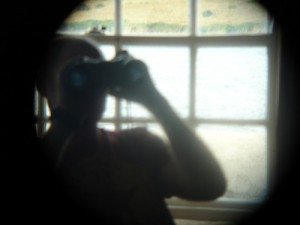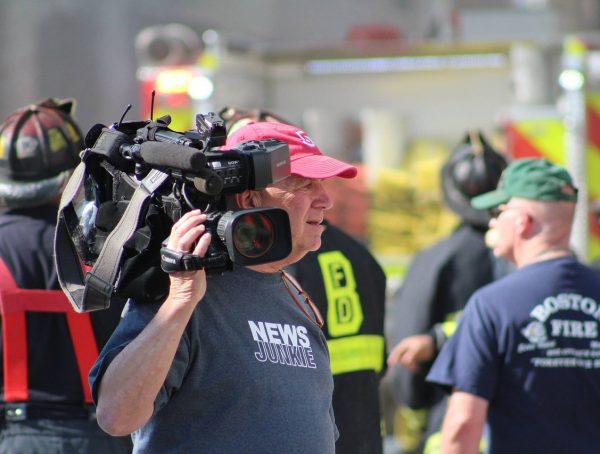Adapted from BROADCAST VOICE HANDBOOK by Ann S. Utterback, Ph.D
 One of the best-kept secrets in every newsroom involves stalkers. Everyone knows it’s a problem, but no one talks about it. Stalkers create a hidden crisis for people because the stress is tremendous, but it is often suffered alone.
One of the best-kept secrets in every newsroom involves stalkers. Everyone knows it’s a problem, but no one talks about it. Stalkers create a hidden crisis for people because the stress is tremendous, but it is often suffered alone.
A stalker is defined as a person who intentionally and repeatedly harasses or follows another person causing that person fear. This unwanted contact can be in the form of phone calls, letters, gifts, or personal contact. These contacts are normally not hostile in the beginning. But what begins as a nuisance can quickly escalate into a threat.
Dr. Park Dietz, one of the country’s foremost forensic psychiatrists, said on 48 Hrs. Investigates (4/23/03) that it’s “how many” stalkers a celebrity has, not “if” they have any. He reported that, “Nobody knows right now how many news anchors get stalked. The likelihood is that for good-looking females on the news nightly, it’s 100%.” This segment of the program, directed by Martin Zied, focused exclusively on broadcasters who have been stalked.
The Justice Department estimates that more than one million women are pursued and harassed by stalkers every year. Dietz says in Currents in Affective Illness (1992), “The nicer one appears to be, and the more approachable, the more one will attract the serious and persistent and deluded subjects.” He believes that the perceived approachability and the high visibility of broadcasters make them prime targets for stalkers. His company sees a couple of dozen cases of stalking involving broadcasters every year.
I have had many clients tell me about being stalked. There is nothing more stressful than thinking your life is in danger. The mental anguish this creates can be paralyzing. It’s like living in a house with no curtains when you are the victim of a stalker. Simply by turning on the television, the stalker can watch you.
Linden Gross, in her book, Surviving a Stalker, says, “Stalking is like a long rape. The stalker’s objective is to force you into surrender.” Broadcasters have left the business because of a stalker and some have been killed.
Here is a safety list to help you safeguard yourself and cope with any stalker situation that might arise.
IF YOU BEGIN TO FEEL UNCOMFORTABLE:
Contact the police if you receive two or three calls, letters, or gifts from the same person that seem suspicious or if the same person approaches you on several different occasions. No threats need to have been made.
Do not talk to the person yourself to try to clarify things or make them understand your feelings.
Do not return gifts or letters. Save these and any telephone messages for the police. Document any contact with the person. Do not eat any food items sent from a stranger. Do not open any unexpected packages or letters. Take them to the police.
WHEN YOU MOVE TO A NEW CITY (or if a stalker becomes a problem):
An on-air name that is different from your real name makes security and safety much easier. Many broadcasters use on-air names. If you choose to use your own name on the air, consider the suggestions that follow:
Request an unlisted and unpublished telephone number. Get caller ID on your phone. Request a complete blocking order (or per line blocking) for your own phone line so your number will not be revealed on others’ caller ID.
Use a private mailbox service to receive all personal mail. You can list your box number as an apartment number. Make certain that the mailbox service will not release your address to anyone other than law enforcement personnel. Send a change of address to friends and businesses. File for confidential voter status.
Write to the credit reporting agencies and give them your new address. Ask that they remove your old address from any past credit history. You might also want to ask the three main credit bureaus to flag your account to alert you to any fraudulent access.
Avoid putting your home address on personal checks or business cards. Use the station’s address. Pay with a credit card in your community to avoid showing your ID.
Never give out your own phone number or address over the phone or in a store. Use your number and address at the station.
If renting an apartment, place the rental agreement in another person’s name. If you must use your name, ask the landlord not to give your name to the city directories. Do not rent an apartment on the ground floor or one that has easy access through windows or balconies.
Have a friend or reputable locksmith install dead bolt locks on all doors. Secure all sliding glass doors and windows with locks. Keep all doors and windows locked. If possible install extra outside lighting.
Demand identification from all repairmen and salesmen prior to entry. Even ask the police for identification prior to entry. Ask neighbors not to give out any information about you to anyone.
Do not put personal information on the station’s web page. Imagine what goes on the web page is the same as a chat room where you are corresponding with someone who seems too interested in your personal life. Keep your comments very general.
Ask that your name and address be left off any address list made up for station employees. Alert the station employees (especially the receptionist, assignment desk, and camera people) not to give out personal information about you such as your birthday, address, or marital status. If you are single, you might consider wearing a wedding ring on the air to give the impression that you are married.
WHEN YOU ARE COMMUTING TO WORK:
Be alert! Many attacks happen in cars going or coming from home or work. Watch for vehicles that might be following you. Always keep at least half of a tank of gasoline in your car.
Have an exact time you are to arrive at work and check in with the same person every day when you arrive. This is especially important if you work an early morning shift. If you are driving in the early morning hours, use a cell phone or radio to talk to someone at the station while you drive in.
Park in a different place everyday both at home and at work and vary the route you drive to work. If you will be leaving after dark, park in a well-lit area. Get someone from security or master control to walk you to your car.
Avoid driving an easily recognizable car and do not use a vanity license plate. Keep your car doors locked at all times both when unattended and when you are driving. Look into the front and rear of your car before entering the vehicle.
Notice where police stations, hospitals, fire stations and other public places are on your driving route. If you are being followed, drive to a well-populated area like a hospital or fire station and sound your horn to attract attention. Remain in your locked car. Use your cell phone to call for help.








